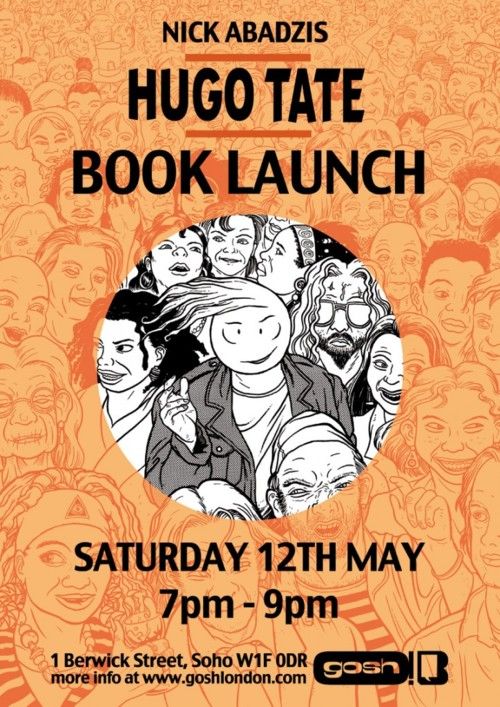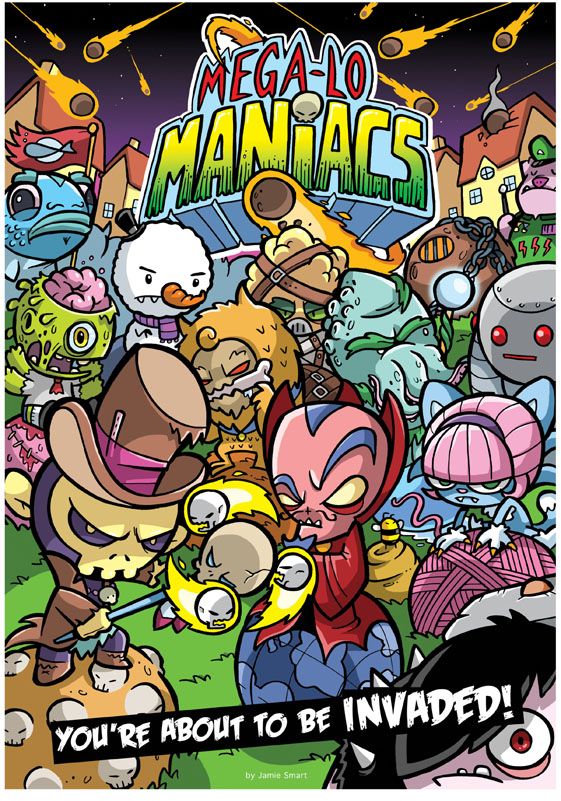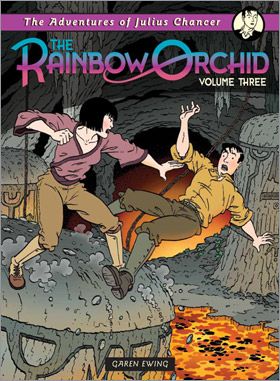The UK comics scene is bustling, with 2000AD celebrating its 35th anniversary, a new kids' comic making waves, and tons of creators working on tons of new projects.
The indy publisher Blank Slate, home of Psychiatric Tales and the anthology Nelson, will be publishing a collected edition of Nick Abadzis's Hugo Tate, and in anticipation of that, Abadzis has set up a Hugo Tate Tumblr for photos, thoughts, and even the odd page of comics.
Meanwhile, Darryl Cunningham has decided not to go forward with a second volume of his Psychiatric Tales and instead will be going in a different direction with History Tales. If that title sounds a bit generic, keep in mind that Cunningham can really tell a story; he posted the beginning of a strip about the Mary Celeste on his blog that reeled me right in.
Jamie Smart's Megalomaniacs debuted in The Dandy last week. Here's his description:
Little meteorites crash-land into Earth, each containing a different alien/monster/robot/pile-o-goo, each of whom want to take over/destroy/eat Earth! Every week a new alien will attempt a nefarious scheme to seize control of our poor planet, and it’s only plucky young hero Rory who knows about it!
Jamie also shares some of his Doctor Who picture searches—like Where's Waldo but with The Doctor.
At the Forbidden Planet, Richard Bruton reviews issue 13 of The Phoenix, a weekly all-ages comic that was launched at the beginning of the year. He shows off some samples of the artwork, too. The Phoenix looks fantastic, with an ever-changing lineup and an impressive array of talent, and I wish the publishers would find a way to allow readers outside the UK access to the comic, whether by exporting it or making it available as an app, as Beano, Dandy, and Strip Magazine have done.
Also, Richard is marking the 35th anniversary of the pioneering adult comic 2000AD by reading every single issue; here's his latest post on that. Making it easier on us Yanks, 2000AD just announced that they will publish the comic digitally the same week it comes out in print. It's not exactly day-and-date—the print comic comes out on Wednesday, the digital on Friday—but on the other hand, the comics are available in CBZ or PDF formats in their store, which means you can save them and read them on pretty much anything with a screen.
The third volume of Garen Ewing's Tintinnesque The Rainbow Orchid is due out today; see the samples at the link for a taste of his lovely artwork.
Lew Stringer debunks a longtime myth at his blog: The Dandy was not the first comic to use word balloons inside panels. Older British comics were presented as a series of panels with text above or below; the tradition persists in Rupert, although it also has word balloons, is a bit confusing. Anyway, popular wisdom has it that The Dandy, which was launched in 1937, was the first to put the words inside the picture, and as usual, popular wisdom is wrong—and Stringer has the photos to prove it. He also has a bit of nostalgia for those of us who know who the real Doctor Who is (Jon Pertwee): Some scans of the maiden issue of TV Action, which was launched in 1972.
Creator Neill Cameron shows off his work space(s) at the David Fickling Books blog (DFB is the publisher of The Phoenix). Asked where he draws, Cameron replied,
In my studio at my computer, surrounded by mountains of paper and with my son poking me with sticks and demanding that I let him watch Transformers instead. At a giant drawing board I liberated from a landscape gardener who gave up on their dream. On massive canvasses propped up on the dining room chairs, while forcing my family to eat off garden furniture. On the sofa, lightbox balanced on my knees, watching Masterchef. In any number of local cafes and coffee shops. On trains, trains are good. Episodes of Pirates of Pangaea, in fact, have been produced on planes, trains AND automobiles. And with sheets of paper held up against a large window in Cyprus.
All over the place, really, is what I’m saying.
And ending on a more serious note, Paul Gravett has an essay on up-and-coming artist Luke Pearson, whose Dull Ache and Hilda and the Midnight Giant have a surreal quality to them.




